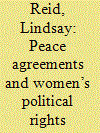| Srl | Item |
| 1 |
ID:
154739


|
|
|
|
|
| Summary/Abstract |
How does leverage vary across different mediators? What influence does this variation have on mediation outcomes? Extant literature has equated mediation leverage with material power. Leverage, however, is context dependent and comprised of two dimensions: capability and credibility. Capability leverage is a function of economic resources and power, while credibility leverage derives influence from historical and cultural ties that bolster a mediator’s contextual knowledge of a conflict. I hypothesize that mediators with capability leverage are more likely to achieve short-term success, whereas mediators with credibility leverage generate more durable settlements. I quantitatively test the hypotheses using civil war mediation attempts from 1989 to 2006. I find that capability leverage does indeed contribute to the achievement of short-term success; credibility leverage, however, generates a more durable peace. The results demonstrate the importance of understanding mediation leverage as a context-dependent concept and highlight the potential long-term benefits of softer forms of mediation.
|
|
|
|
|
|
|
|
|
|
|
|
|
|
|
|
| 2 |
ID:
182683


|
|
|
|
|
| Summary/Abstract |
Approximately one-quarter of civil war peace agreements contain some reference to gender, prompting the question of whether or not gender provisions within peace agreements are effective tools for improving women’s rights following conflict. As calls by the United Nations and the international community place increasing emphasis on women’s involvement in peace processes, this article generates insight into whether peace agreements, a key component of peace processes, help to spur greater political rights for women. The theoretical expectations of the article posit that peace agreements generate legal frameworks for post-conflict states. Specifically, peace agreements have the potential to tie actors’ hands to new policies and generate shifts in societal norms and practices; the direction of new policies and practices, however, is dependent on the contents of agreements. When agreements are gender-inclusive, they increase the likelihood of improvements in women’s political rights. The expectations are quantitatively tested using civil war peace agreements signed between 1981 and 2011. The findings indicate that the content of agreements matters; gender-inclusive agreements lay the foundations for improvements in women’s political rights following conflict. The article demonstrates that peace agreements, when crafted to include gender provisions, are meaningful tools that international and domestic actors can harness to strengthen women’s rights after civil war.
|
|
|
|
|
|
|
|
|
|
|
|
|
|
|
|